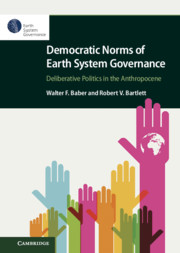
- Cited by 5
-
Cited byCrossref Citations
This Book has been cited by the following publications. This list is generated based on data provided by Crossref.
2021. Publications Received. Contemporary Sociology: A Journal of Reviews, Vol. 50, Issue. 5, p. 447.
May, James 2024. Conclusion: Environmental Human Rights in the Anthropocene. SSRN Electronic Journal,
Berg, Monika 2024. The valuation of a mine – values, facts and contested notions of sustainability in the prospecting for new mines. Environmental Sociology, Vol. 10, Issue. 3, p. 294.
Lee, Joohee Yang, Soeun Zajchowski, Chris A.B. and Kim, Hana 2024. Communicating particulate matter risk: the effects of empoweredness and trust in government information on protective behaviour. International Journal of Urban Sciences, Vol. 28, Issue. 4, p. 631.
Bartlett, Robert V. 2024. Implementing Climate Change Policy. p. 80.
- Publisher:
- Cambridge University Press
- Online publication date:
- August 2021
- Print publication year:
- 2021
- Online ISBN:
- 9781108923651


